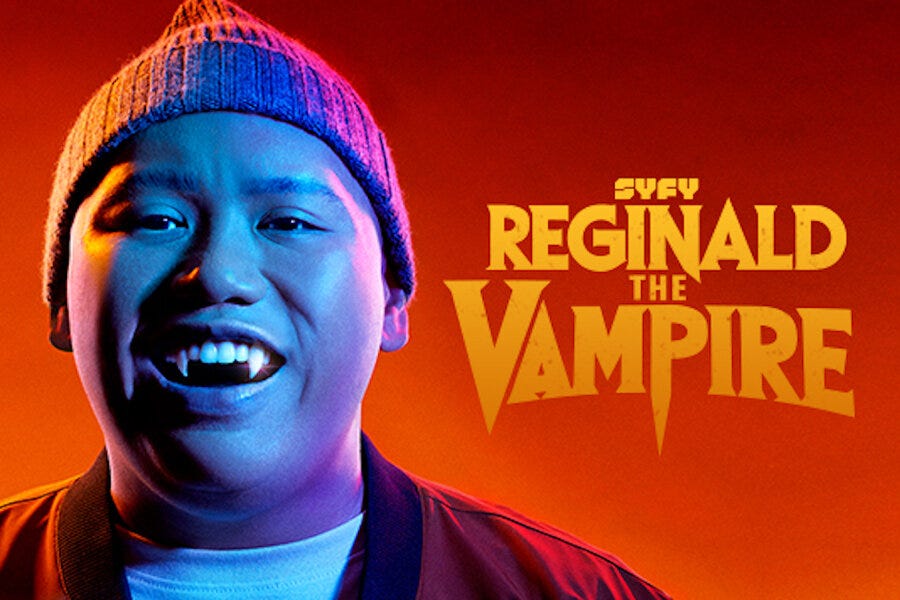Creating a Life Worth Reading
Lessons from Johnny B. Truant, the punk rock writer
What can a bestselling author teach us about creating a life worth reading?
Reginald lies dying on the pavement with fang wounds on his neck. Maurice kneels over him asking for permission to save him. Reginald agrees and goes unconscious.
– Reginald the Vampire, SYFY Network
This is the pivotal scene in the premier of Reginald the Vampire, a series on the SYFY Network. The show stars Jacob Batalon of Spider-Man fame and is based on the Fat Vampire book series by
.But who is Johnny B. Truant?
What can he teach us about creating a life worth reading?
How did he go from being a PhD student working in a deli to becoming a bestselling author with a popular TV series?
The Copywriter, Blogger, and Course Creator
I discovered Johnny’s work in 2010 while looking for resources to help me become a better writer and blogger. One of the top results was an article on Copyblogger called How to Write Your Ass Off. The edgy title stood out from the rest of the bland search results.
Of course, I had to click the link.
The featured image was a shadowy figure wearing a hat. The first line read My name is not Johnny B. Truant.
What?
He shared his reasons for using a pseudonym, and his thoughts on the importance of writing what’s real and being brave. His writing style was captivating and made me want to continue reading. And that’s what I did.
I followed the linked posts at the bottom of the page for at least 45 minutes. Time evaporated. It was like binging a Netflix series.
Johnny’s provocative writing style pulled me in month after month. He was a master copywriter with a punk rock vibe. His titles included:
The Badass Project
The Universe Doesn't Give a Flying F**k About You
The later article was so popular that it led to a book of the same name.
In 2012, I attended a webinar he cohosted called How to start a $100,000 per year business, even if you're starting on a shoestring. The session was so compelling that I enrolled in their 8-week blogging course, The Bootstrap Boot Camp.
His fans didn’t know that he was about to make an epic pivot in his writing career.
The Author, Podcaster, and Entrepreneur
Johnny wrote his first book, The Bialy Pimps, in 1999 while pursuing a Ph.D in molecular genetics and working in a deli. The book was a fictional story that mirrored his life at the deli. He said the first draft was just an exaggerated version of his experiences. He even used his coworkers’ real names until the later drafts.
In a 2022 interview on The Creative Penn podcast, he said he wrote The Bialy Pimps as a creative escape from counting red-eyed fruit flys in the lab. A role he hated.
He finally published the book in 2013, a year after Fat Vampire was released.
Yes, the book that led to the series on the SYFY Network.
Around the time I attended his blogging webinar, Johnny started the company Sterling and Stone with fellow writer Sean Platt. The pair with writer David Wright became ridiculously prolific storytellers and world builders. They published dozens of books each year, often as multi-volume book series.
Within a few years, their company grew to include producing podcasts, developing writing software, and hosting a convention. The success of The Self Publishing Podcast helped Johnny transition to a full-time writer. It also led to teaching other writers through nonfiction books and courses.
Sterling and Stone evolved into multimedia story studio with 15 writers creating stories for books, audio, and screen. Their goal is simple. To change the world with stories.
Johnny has become one of the most prolific writers of our generation. He has authored and coauthored more than 100 books. I own 28 of them.
He also writes more than one million words each year. Let me repeat that for those in the back row.
HE WRITES MORE THAN 1 MILLION WORDS PER YEAR!
A Better Story Using Genre Therapy
I found an interesting interview with Johnny on The ZDoggMD Show on YouTube while researching people who reinvented themselves. ZDoggMD is a physician who usually produces content about health and medical topics. The two connected online over their shared experience doing research with fruit flys in graduate school.
The part of the show that caught my attention was the conversation about Genre Therapy. I’d heard the term but couldn’t remember where I’d heard it until Johnny referred to his book, The Story Solution.
The book presents the idea of life genres. In this context, genre is a metaphor for the categories where we place ourselves - or get placed by others. Among other things, these include your type of career, marital status, hobbies, and personality.
Genre Therapy is a process that Sterling and Stone uses to help writers find the best fit for their writing. The first question is what genre do you want to write, but the second question is why?
Johnny gives an example of a new science fiction writer who joined their story studio. She struggled with her work, so they used genre therapy to help her discover her best fit.
After going through Genre Therapy, it was clear that she should write young adult fantasy instead of science fiction. As Johnny explained, “in science fiction, you have to explain the magic, but she just liked the magic.” She struggled because she was forcing the wrong genre.
Changing My Genre
I could’ve used Genre Therapy when I experienced burnout in my physical therapy career. Blind to my misery, I could’ve benefited from an outside observer asking me why I still wanted to be a PT. Maybe my answer would’ve reeked of the sunk cost fallacy. I invested a lot of time and effort into my career.
Then again, maybe my epiphany would’ve come sooner. I might have leaned into my passions for writing and tech sooner. I might have realized that sometimes our genre changes as we grow.
Now What?
In The Story Solution, Johnny and his coauthor describe choosing our path in life as writing our own story. The decisions we make lead to the genres we live in. Our careers. Our marital status. Whether we have kids. He also reframes setbacks and failures as plot twists. The important thing is that we can choose new genres at any time.
Johnny B. Truant’s career reads like a novel. He went from a Ph.D. student to a copywriter, a self-help blogger, and a best-selling author. And he now has a popular TV show based on one of his book series.
He got there by creating his own path and challenging the status quo. Reframing his failures. Writing his own story.
As long as there’s story left, failure isn’t the end. It’s merely a plot twist.
- Johnny B. Truant, The Story Solution
You’re the hero of your own story.
Keep going. Change genres.
Create a life worth reading.
1To learn more about Johnny B. Truant visit his Substack called Inspired as F**k or his website.



I promise I wasn't self-centeredly searching Substack for my own name. I was exploring the Substacks of a lot of folks who started following me after my Authorstack review and was pleasantly surprised to find this. A whole post about me! I'm beyond flattered. Thank you.
It's absurdly funny to me that you linked to the "wears women's underpants" article on Copyblogger. That joke was so nuanced, nobody got it entirely. First, you had to know that James Chartrand, another regular Copyblogger contributor, had been writing for years as a man, then came out on Copyblogger as a woman ... in an article called "Why James Chartrand Wears Women's Underpants." You had to know that it's James in the photo at the top of my version, biting the apple, and you had to know that at the time, my own avatar was exactly the same: black and white of me biting into an apple, which was spot-colored yellow-green. You'd have to know, somehow, that after meeting James and learning her real name (which I refuse to use; she'll always be James to me), I pitched this idea of an April Fool's Day post, because Copyblogger always did great April Fool's Day posts. This time I'd be coming out as a woman, but I'd have to play it straight because it was funnier that way. But it'd be okay. I'd write about my struggles in the Mustache and Beard Championship circuit, and I'd do it so bizarrely that everyone would KNOW it was a joke. But some people didn't. I got emails of support for being brave, and I had to reply and tell them that it was a joke.
Those people didn't write back. Oh well; that's the price you pay for great comedy. It was worth it.